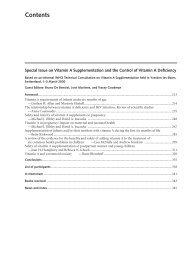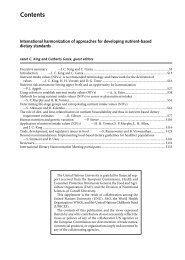United Nations Correspondence Manual - UNU
United Nations Correspondence Manual - UNU
United Nations Correspondence Manual - UNU
Create successful ePaper yourself
Turn your PDF publications into a flip-book with our unique Google optimized e-Paper software.
Some points<br />
of style<br />
30<br />
Positive rules<br />
(a) Be concrete and specific, rather than vague and indirect.<br />
(b) State your facts or ideas directly ( subject-verb-object).<br />
(c) Use verbs in the active rather than the passive voice.<br />
(d) Use concrete rather than abstract words.<br />
(e) Use short words, short sentences, and short paragraphs rather than long<br />
words, long sentences and long paragraphs.<br />
Negative rules<br />
(a) Don’t use any more words than necessary to convey your meaning.<br />
(b) Don’t use a circumlocution if a single word or phrase will do.<br />
(c) Don’t use emphasis (bold, italics, underlining) in correspondence.<br />
(d) Don’t use needless adjectives and adverbs (don’t overemphasize).<br />
(e) Avoid anything which might offend the sensibilities of the readers.<br />
Well-constructed papers; well-constructed paragraphs<br />
5. Well-constructed papers present soundly reasoned propositions, starting with<br />
introductory paragraphs, followed by intermediate paragraphs to develop the narrative<br />
point-by-point and ending with concluding paragraphs to present recommendations,<br />
make requests or invite other forms of response.<br />
6. Introductory paragraphs should normally begin with a statement of the proposition<br />
to be presented in the paper. These paragraphs should be brief, with no more than<br />
six lines of text; the major points to be covered in the paper should be identified. The<br />
narrative should be developed in a series of intermediate paragraphs analyzing the<br />
points in order of importance as set out in the introductory paragraph. Concluding<br />
paragraphs should be very brief, recapitulating the analysis, drawing conclusions and<br />
making recommendations, inviting comments or whatever form of response is desired.<br />
B. Spelling<br />
7. <strong>United</strong> <strong>Nations</strong> correspondence follows the spelling given in the latest edition<br />
of The Concise Oxford Dictionary of Current English. Where the dictionary gives<br />
alternative spellings, use the one printed first. Where British and American spellings<br />
differ, the British usage is followed in <strong>United</strong> <strong>Nations</strong> texts. Where the dictionary<br />
gives part of a word within parentheses, use the longer form.<br />
C. Capitalization in English<br />
8. Use initial capital letters sparingly, according to the general rules set out below.<br />
Use initial capitals<br />
(a) To mark beginnings:<br />
(i) The first word of a sentence;<br />
(ii) The first word of a subsidiary part of a sentence set out<br />
as a subparagraph or item on a list;




